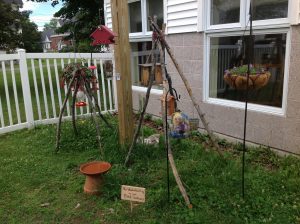Leah Boucher –Staff Reporter
For the second year in a row, UMF hosted a summer institute for Maine educators and pre-service educators on June 23rd and 24th, where they learned how to incorporate nature into all areas of education.
Participants were able to get out and explore the nature around Farmington the day before the actual conference, where they could hike to Poplar Stream Hut and tour the local Bonney and Flint Woods, then settled back at UMF for a day of conferences.
Assistant Professor of Education and committee member for this institute, Kathryn Will-Dubyak, is pleased that UMF can offer a wide variety of conferences, which are the first of their kind in the area. “This is the only nature-based institute spanning Pre-K through 12 in greater New England to my knowledge,” said Will-Dubyak, “which creates an incredible opportunity for the many pre-service educators and educators around Farmington.” There were around 80 participants this year who attended both days.
From this program, participants were given the chance to listen to a variety of lectures but also participated in hands-on experiences, giving them first-hand knowledge on how nature plays a crucial role in education across grade levels.
“This summer institute helped educators either understand how they could begin to engage with nature in all areas of instruction or to develop their understanding of how nature can play a large role in a variety of instructional opportunities,” said Will-Dubyak.
Associate Professor of Science Education and another committee member of this institute, Carole Lee, was asked to be a leader in this year’s set of conferences.
“Last year, there was more of a focus on lower elementary grades, and I was thrilled to join this program and bring my knowledge of nature among the upper grades in school,” said Lee. “I led some conferences myself, such as Engineering Design Inspired by Nature as well as Biomimicry.”
Another conference participants could attend focused on the idea of a natural playground, which UMF was able to put into action last year outside the Sweatt-Winter Child Care and Education Center. A third-year child care aide at Sweatt-Winter, Ashley Hinkley, who is also a senior Elementary Education major, noticed a major shift in the design of the playground once the natural playground replaced the old one.
“The previous playground had one slide, a climbing wall, and a picnic table,” said Hinkley. “The natural playground has a berm for the kids to climb on with three slides and a garden that the kids water, pick from, and later eat.”
Another feature of this new playground that is a hit among the children is the bird-watching area. “There are bird feeders and bird baths outside, and inside there are journals for the children to sketch the birds they see through the window,” said Hinkley.

The bird sanctuary at Sweatt-Winter, part of the new natural playground on campus.
(Photo Courtesy of the UMF College of Education, Health, and Rehab Services.
Carole Lee is grateful that a topic from the conference was able to be shown to participants right here at UMF. “The success of the natural playground installation on campus shows educators that nature can help children see how they can interact with their environment in a positive way, such as feeding the birds and building houses for them,” said Lee.
There are plans for committee members to meet over the course of 2017 and 2018 to see if a third annual nature-based institute will take place next summer.
“We are not sure as of yet if it will happen, as it takes an incredible amount of people power for pre-conferences and conferences that only span two days, but it is definitely a possibility,” said Will-Dubyak.